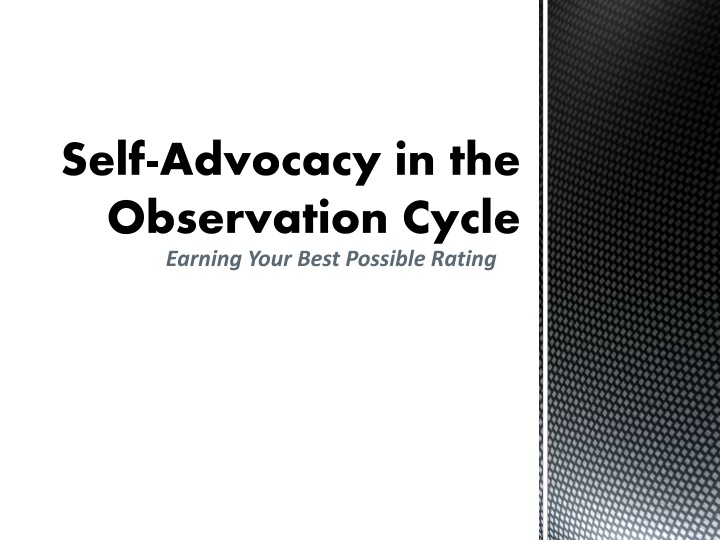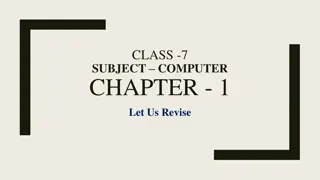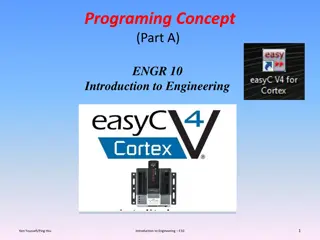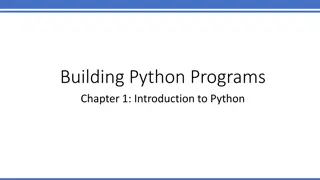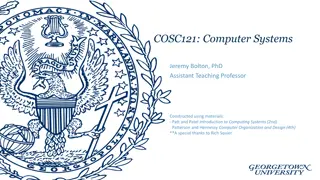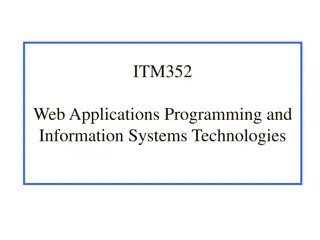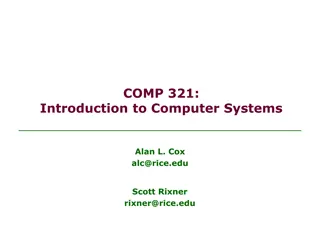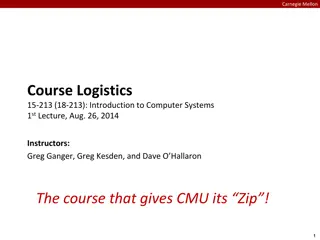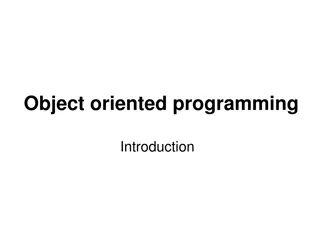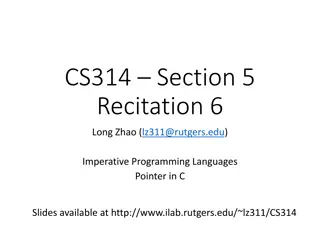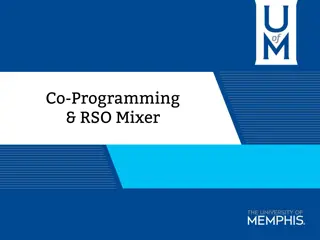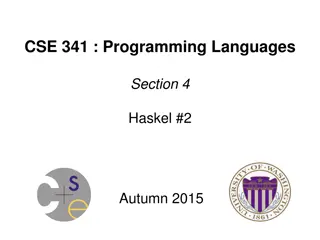Overview of Computer Programming in Basic Computer Systems
A computer system comprises hardware and software components, crucial for executing programs. Various programming languages such as binary code, symbolic code, and high-level languages are essential in creating instructions for a computer to follow. Understanding the different forms of programming languages is vital for programmers and individuals interested in computer architecture.
Download Presentation

Please find below an Image/Link to download the presentation.
The content on the website is provided AS IS for your information and personal use only. It may not be sold, licensed, or shared on other websites without obtaining consent from the author.If you encounter any issues during the download, it is possible that the publisher has removed the file from their server.
You are allowed to download the files provided on this website for personal or commercial use, subject to the condition that they are used lawfully. All files are the property of their respective owners.
The content on the website is provided AS IS for your information and personal use only. It may not be sold, licensed, or shared on other websites without obtaining consent from the author.
E N D
Presentation Transcript
Self-Advocacy in the Observation Cycle Earning Your Best Possible Rating
SELF-CONSCIOUS EMPOWERED Personal Reflection: How do administrator observations make you feel? Under-valued BULLIED
Session Objectives *Understand the importance of self-advocacy. *Identify ways that teachers can become better self-advocates during the observation cycle.
The observation cycle has been designed to incorporate the elements of the NEAT process into the post-observation conference and reflection process. In the event that a principal determines that a teacher is performing at an Unsatisfactory or Developing/Needs Improvement level, the procedures outlined in Article VII, Section H-6 shall be implemented to the extent they are not included or already covered by the formal observation cycle. Teachers are entitled to union representation in meetings scheduled outside of the formal evaluation/observation cycle to discuss the teacher s performance. Instructional Master Contract Implementation of the Student Success Act MOU Section E, #3
What is Self-Advocacy? Self-advocacy refers to an individual s ability to effectively communicate, convey, negotiate or assert his or her own interests, desires, needs, and rights. Self-Advocacy IS: *Speaking confidently about your classroom practices *Showing the administrator what they may not have seen *Shining a light on the positive while demonstrating an awareness of growth opportunities Self-advocacy is NOT: *A defensive, knee-jerk reaction *A knock-down, drag-out argument *An attack on the administrator s professional assessment
2017-18 Observation Overview Updating Electronic Observation Platform Expected to be complete in Qtr 2 DP (narrowed focus) Still includes Domain 3 in additive points Still required to create the DP Plan Now worth more!! (weighted at 20%) Classroom Visits Informal (no required pre- or post-conferences) Unannounced May vary in length Domain1 finished anytime after second visit Domains 2 & 4 will NOT be scored!!
Choosing Deliberate Practice *Narrowed to 8 target elements: #1 Providing Rigorous Learning Goals & Performance Scales #6 Identifying Critical Content #11 Helping Students Elaborate on New Content #12 Helping Students Record and Represent Knowledge #17 Helping Students Examine Similarities & Differences #18 Helping Students Examine Their Reasoning #20 Helping Students Revise Knowledge #22 Engaging Students in Cognitively Complex Tasks Involving Hypothesis Generation and Testing Focus on growth opportunity, engage admin in DP discussions, gather evidences for elements in Domain 3 Remember that you can ask for an additional observation to be conducted at a SPECIFIC time if the administrator is unable to score your DP in the classroom visits
Domain 3 Evidence Examples DP in MyPGS Self-assessment Plan Reflections PD Transcript (screenshot) Post-Conference Reflection Forms Assessment Reflection Tools Reflection on Why using the problem solving cycle
Classroom Visits Be Proactive! Encourage your administrator to drop in during particularly interesting lessons Don t forget to use your pass if you sense it won t go well invoke the dead dog clause
Classroom Visits Though they may be brief, admin must provide specific, scripted feedback within 10 days of visit IF data is to be used in the evaluation Date of visit Elements observed Specific evidence of the element
Immediately After Classroom Visit Make notes about the lesson that was observed Focus on DQ5, DQ7, DQ8, & DQ9 Any particular relevant student behaviors Any moments that you thought went very well Any difficulties and how you addressed them If not collected in advance, revisit and revise the lesson plan to ensure it addresses Domain 2 elements Review observation feedback and gather artifacts tied to scored elements Consider student work samples Take pictures of classroom
Post-Conference? Within 10 days, but as close to observation as possible, you should have feedback on the observation Request by email if 5 days without feedback Ask for a conversation to discuss what was observed Bring Evidence & Artifacts Be prepared to speak confidently about the learning strategies used during the lesson Take Notes!
Post-Conference Goal Because the shift in observation processes is intended to allow for evaluation over time, the individual classroom visits will NOT be scored. Meeting with your observing administrator gives you the opportunity to talk about where the current evidences might be scored and what would need to be seen to reach the next level. Know What You Need: To be HE in Domain 1 No elements at Beginning or Not Using 60% elements at Applying One element at Innovating
Closing Domain 1 Once the administrator has collected sufficient evidence to support scoring of Domain 1, they can recommend that the results be finalized. If the teacher believes that the score can be improved, he/she may request that the observation remain open and classroom visits will continue. The Instructional Practices Score (D1 + DP) must be completed by the end of Qtr 3.
You Have Control!!! Perhaps more than you think .
Self-Advocacy Makes A Difference Be EMPOWERED! Become strong, confident self-advocates!
